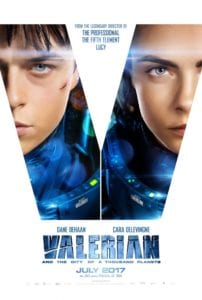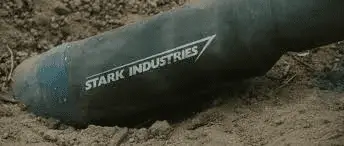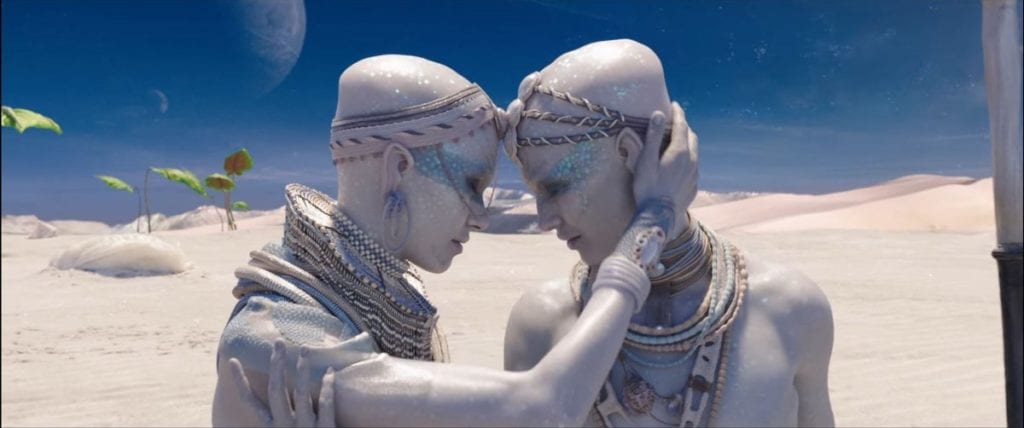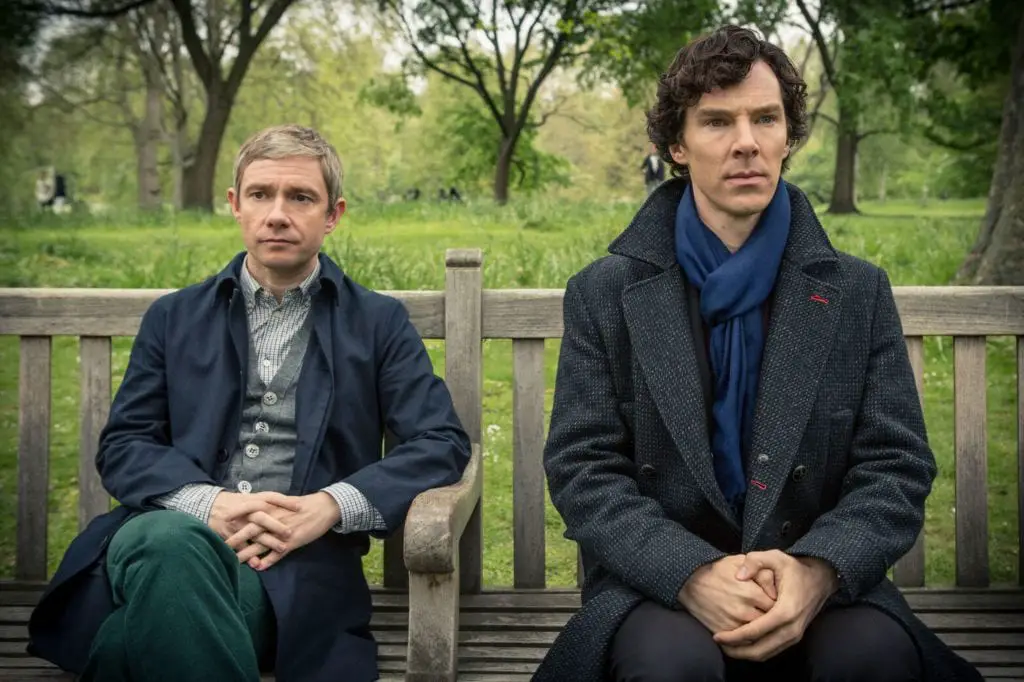It’s been almost two months now since Luc Besson’s new movie came out and the reception to Valerian and the City of a Thousand Planets has been mixed. Currently sitting at 51% on Rotten Tomatoes, the movie isn’t near the poor ratings of the most recent The Mummy or The Emoji Movie, but a sci-fi movie by the director of The Fifth Element could have hoped for a better score.
Not that I disagree with it in any way. If anything, I personally didn’t enjoy this movie. Valerian is, if anything, an interesting movie, in its weird and clunky way. There is a logic to this movie and how it tries to resemble huge Hollywood Science-Fiction blockbusters, while also having its own style.
If you didn’t get it from those first paragraphs, I think it failed or, at least, that the result is extremely flawed. I want to examine how this movie tried to approach its story and characters, and how it didn’t succeed, starting today with only one element. But the most important according to this movie: its titular character.

I’ll try to keep everything general, but spoiler alert for the entirety of Valerian and the city of a thousand planets.
What’s with this character?
To analyze a character, we should look at their whole story, their arc if they have one. What it brings to the overall movie and how their themes fit the whole picture. In the case of Valerian, let’s start with its introduction. From the first scenes with him, what are we supposed to know about him, and what kind of emotion is he supposed to make you feel?
The first two sequences of scenes in the movie aren’t dedicated to our main character at all. One of them centers around the creation of the “City of a Thousand Planets” from its debut as the ISS to what is known as Alpha. It’s a beautiful, simple sequence, that quickly establish the context and offers us a rare sight: a first contact of humans with aliens that goes pretty well. The second shows us a new species, living in harmony and joy on their world, before the apocalypse destroy their homes and their planet.
Only after that are we allowed our first look at our main character. We discover him on the beach, relaxing before a mission. Said mission will be the first true action scene of this movie. So, before it starts, the movie is going to dump some information on its viewer about the main characters. Here’s what we know of Valerian, from his dialogues with Laureline and with a superior.
- Valerian is both a competent agent, and extremely confident in his capacities. He doesn’t seem to be taking this new mission seriously, only reading the assignment after they land. He makes it clear to Laureline that it’s not going to be a problem and reminds her that he has some kind of perfect memory.
- Valerian is quite the ladies man, and he apparently keeps a playlist, which I’m going to assume are music he associates with every girl he’s ever been with. We briefly see one or two walls covered in pictures, all humans or humanoid corresponding to our beauty standard, so everything is fine on that end, don’t worry.
- Similar to his over confidence, our main character doesn’t take things seriously in general, which seems to have impacted his relationship with his colleague, Laureline, who can’t trust him when he asks to marry her. (They’re not dating yet, so it’s probably wise of her)

From there, we already have a pretty good idea of the kind of character Valerian is. I have a feeling it wasn’t meant to be subtle; he’s a pretty straight-forward kind of guy. Valerian, in this movie, is a combination of two pretty common archetypes. First, there is the bad boy: old school, kind of dark, pretty boy, usually selfish or uncaring. He’s good with the ladies and never hesitates to use that skill. He’s supposed to be charming, witty, and a bit dismissive of everyone.
On the other end of the spectrum is what I call “The Asshole Protagonist,” an archetype that has become popular much more recently. Don’t worry, you know them. You’ve probably seen one in Iron Man or Iron Man but with magic, or in pretty much every “Sherlock Holmes”-styled character since House MD. It’s a character who knows what he’s doing, and is often the best at his job, or anybody’s job. However, his superior ability somehow prevented him from learning proper behavior and politeness, so he often acts like a dick to everyone, either voluntarily or not. You’ve probably heard of him as “The Sociopathic Protagonist” but let’s be real, they’re just assholes most of the time.

You may think Valerian isn’t the worst at that, and it’s true, but a lot of aspects in his characterization make me think the writer tried to give him that archetype. Namely his overconfidence about the success of his various missions and the fact that he keeps reminding us about his photographic memory. (A cheat code often used by this archetype.) Plus, keep in mind that later in the movie, at least two scenes clearly establish that Valerian is a very good agent, capable of destroying wave after wave of enemies without breaking a sweat.
The Bad Boy and the Asshole Protagonist are usually, like the average serial killer, white males between 25 and 40 years old. They are white because, you know, protagonist, and male because if they acted the same way as a female they’d be described as “Kind of a bossy bitch” (because sexism, yay). Valerian fits this description, although he looks young in this movie.
Both those archetypes are often played, especially in movies, with the idea of a redemption arc, or at least the character learning a lesson by the end. That’s also the case in this movie, as I’m going to detail later. But now that we have a pretty good idea of what this character is supposed to be, let’s see how it’s handled in this movie.
Introductions are important
I brushed over the first scenes with our protagonist quickly, and that’s not so much to make a point as it is because there isn’t a lot to say. In a movie like this, focusing heavily on the action and on its world’s beauty, it was vital to introduce the characters in a simple yet clear way. They aren’t meant to be deeply complicated human beings. Yet, they managed to hit a wall with Valerian.
You see, it’s hard for an audience to really feel sympathy for a guy who acts like an ass all the time. One of the first thing you want to show in a situation like this is how good he is at his job. Then, everyone can think, “Yeah, he’s an ass, but at least he’s doing good things.” It’s simple, but it works. We like Sherlock because despite being a dick, he solves crimes and, through that, can help a family. It’s even easier with House who literally saves lives while being an horrible human being.
For an action hero, seeing him in action is a great way to demonstrate his talent and therefore shut down criticism of his behavior after that. Or, if you want to push him toward his arc already, he can have some form of ironic comeuppance.

The first scene of Valerian is him relaxing. Then he gets ready for a mission in the laziest way possible, all while reminding everyone of how good he is. The movie had two options: either the first mission was a complete disaster, to set Valerian on the right path, or it was a resounding success, demonstrating the protagonist’s skills.
We had neither. Sure, the mission succeeded but not exactly with flying colors. The whole idea of this sequence was amazing, for sure, and Valerian demonstrated a talent for improvisation. But compared with two of the fight scenes Valerian takes part later in the movie? Not really impressive. Especially since this mission ends in the death of the crew that was supposed to work with our agents. (Something neither of the protagonists even acknowledge, by the way.)
Here, the movie hits its first dissonance. We’ve been told Valerian was good at his job, but what we saw was a butchered mission where he would have been killed without Laureline, and also managed to lose his team in the process. Something that could be framed as a lesson to him, a slap in the face he would have to recover from.
But no, the characters don’t think about it like that, and the movie doesn’t frame it like that. It’s a relative success for the character’s mission and, as such, a clear failure in the introduction of those characters. The movie took its time to create its universe and present it to us. This weird mission involving two different dimensions was meant to solidify it and show us what could be done with it. Unfortunately, it had been used only as that, and not an opportunity to establish characters.
Now, here’s where I have a problem. I can’t tell if this sequence was meant to not impact Valerian’s character, or if it was meant to be a failure for him and the movie just forgot to show us that. Considering how the movie treats Valerian’s arc, it could very well be both. In any case, from this very first mission and the scenes that precede it, the audience will likely come out with this conclusion about Valerian: he’s a pretentious prick that isn’t even that good at his job, and doesn’t even seem to realize it.
Not a good start.
On arcs and changes
Up until now, it wasn’t a great start, but it wasn’t a complete waste either. Valerian didn’t seem all that sympathetic, but maybe that was never the point. As the movie goes on though, it’s slowly apparent that the writers forgot another important part of their job: giving this character any kind of arc.
Now, I don’t want to say that giving characters an arc is an absolute and complete necessity in any given story or movie. But, in this case, it did seem necessary in order to make us appreciate this guy, since his introduction really didn’t do the job. Some may think that he did have an arc, and that’s thanks to one of the final scene of the movie, a scene that attempts to give depth to this character and his partner Laureline.
Quick summary: after many twists and turns of their story, Valerian and Laureline have finally uncovered the truth. The Obvious Bad Guy is a bad guy, and he hurt the Na’vi of this universe (The Pearls). Now, they have defeated him and got back the MacGuffin that the Na’vi wanted to retrieve. Laureline wants to give it to them, and suddenly Valerian refuse because it’s… government property?

This scene is where the movie completely crumbled to me. This is the textual definition of useless drama. Valerian suddenly caring that much about the hierarchy and the orders he was given come out of nowhere. At this point, it sounds like a cheap way to introduce a conversation between our protagonists just so Laureline can start talking about love and how important and beautiful and strong it is compared to any force in the universe.
Let’s be fair. Knowing this is coming, if you watch the movie again, you’ll start to notice that it doesn’t come entirely out of thin air. Valerian plays with his rank more than once, remind Laureline of her place by giving order to her. We never got the idea that he was that focused on military rules, but it’s not a complete stretch. However, it does seem strange from a guy who, at the start of the movie, didn’t seem that concerned with doing the job right.
Why would Valerian care if this thing gets resolved “by the rules” or not?
That’s where the few elements of characterization we had seen before come into conflict with what we currently see on our screen. Bad boys are, by sheer definition, not adept at following the rules. And Assholes Protagonists usually have no respect for hierarchy and rules, preferring to follow their own instincts to get the job done. To pretty much everyone, Valerian fits one or both of those categories. He should have just handed over the MacGuffin, no discussion needed.
If he had done that, though, we wouldn’t have had any big scenes for our romantic subplot. Because yeah, we have that, remember? Valerian keeps asking his partner to marry him. Well, this scene at the end is made for the romantic subplot to make at least some sense. We finally see Laureline telling this guy that he doesn’t believe in the power of love. The point is, there is some progress.
This clearly should have been the culmination of Valerian’s character arc, ending with him learning something about the world and how to interact with it. Unfortunately, it wasn’t that he needs to respect others or “try to be nice” sometimes, or even act responsibly when on mission, no. It was believing in the power of love, something that wasn’t seeded in any way and that comes out as cliché and simplistic as possible.
This is the writers admitting they didn’t have any arc for this character and just dropped the “Power of Love” into this to pretend there was some resolution.
If we truly look at it, what we have at the start of the movie is an asshole who showed no respect to anyone and is pathetically trying to get a girl by screaming that “he changed and is different now” and by the end, he gets the girl…after she took some time to scream at him for being heartless or something? He doesn’t even really get her, I suppose because they want to keep this subplot rolling for the next parts of this great story.
Ultimately, it’s not a character arc. It’s not even a resolution to the romantic subplot either; it’s drama added to the final scene just so it wouldn’t be “that simple” and our characters can have a discussion about it, even if it sounds really stupid.
Acknowledging your protagonist’s personality
When I first wrote this, the last section was called “Punishment and reward” and I wanted to talk about the fact that Valerian’s behavior never got punished by the narrative. I planned on drawing comparisons to the other kinds of Asshole Protagonists that I used as examples earlier.
The thing is, most of them are usually rewarded by the narrative in some way, because they are protagonists. But still, they also get challenged in different ways.
See, Marvel movies have a lot of entitled white guys as protagonists; Captain America is an exception in this universe, not the rule. You probably saw people calling out Marvel for their jokes that deflate all tension in their movies, and I can understand that, but notice how half the jokes are played against the protagonist of the story. Whether it is Starlord desperately trying to get people to remember his name or Stephen Strange getting his ass kicked by magic right after being so smug about science.
Same with “Sherlock”-type characters. Only they aren’t so much mocked as they are challenged by the narrative and the other characters. Take House. In the first episode it’s clearly stated that he “rarely meets with patient” because he doesn’t believe they have anything interesting to say (to be short). What does he also do in the first episode? Meet the patient. It’s not stupid, nor is it a mistake of the writers. It’s them telling you that this story will be about challenging the worldview of this particular character, even if, as the protagonist, he will often end up on top.

Now, I don’t want to say those movies and TV shows are perfect in the treatment they inflict upon their characters for being assholes. But at least they acknowledge the issue and actually try to challenge them, even if they are only pretending to.
Here’s the thing though, to challenge your character, you first must acknowledge he has an issue. Basic really, but look back at Valerian with that fact in mind, and suddenly a lot starts to make sense.
Valerian, the character, is never challenged by anyone outside of Laureline. Nobody seem to acknowledge the fact that he kind of acts like a jerk. Laureline gives him shit for it, but for all we know, it could very well be because he keeps a playlist of all the girls he slept with, or because he doesn’t believe in the power of love. Either way, it’s related to the romantic subplot, not his behavior outside of it.
At no point in the movie is Valerian made fun of because he acts smug. At no point does anyone react to it, apart from Laureline and the occasional sighs from his superiors. (Among them, the bad guy, which doesn’t help.)
The real dissonance of this movie lies here, with Valerian’s characterization. Seeing how wonderful and detailed the ideas can be in this movie, it sounds weird that its protagonist’s personality never got looked at twice. For Valerian to have an arc or even a proper introduction, the movie would have to know what this character is and what it wants to do with it. Apparently, it does not.

This has tremendous effects on the feeling Valerian and the City of a Thousand Planets creates in its viewer. Its main character seems to have been written with a specific personality, but in a movie that wasn’t meant to involve a character with such a personality. As a result, it’s difficult to watch this movie and truly consider it Valerian’s story, which is a problem since his name is in the title. (And unlike a certain Mad Max, we don’t have another character to label the protagonist.)
I talked about Valerian, the character, a lot more than I thought, so I’m going to get back to the movie next time. In the next article, I will compare it with another sci-fi movie, one beautiful and filled with ethereal aliens living in harmony with nature and one that got a much better reception than Valerian did.
Oh, and this one has Na’vi as well.

